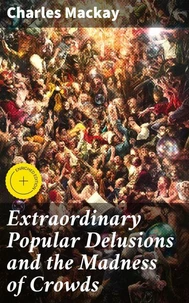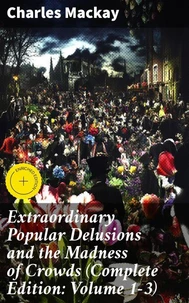Extraordinary Popular Delusions and the Madness of Crowds
Par :Formats :
Disponible dans votre compte client Decitre ou Furet du Nord dès validation de votre commande. Le format ePub est :
- Compatible avec une lecture sur My Vivlio (smartphone, tablette, ordinateur)
- Compatible avec une lecture sur liseuses Vivlio
- Pour les liseuses autres que Vivlio, vous devez utiliser le logiciel Adobe Digital Edition. Non compatible avec la lecture sur les liseuses Kindle, Remarkable et Sony
 , qui est-ce ?
, qui est-ce ?Notre partenaire de plateforme de lecture numérique où vous retrouverez l'ensemble de vos ebooks gratuitement
Pour en savoir plus sur nos ebooks, consultez notre aide en ligne ici
- Nombre de pages619
- FormatePub
- ISBN859-65--4738904-0
- EAN8596547389040
- Date de parution13/11/2022
- Protection num.Digital Watermarking
- Taille4 Mo
- Infos supplémentairesepub
- ÉditeurDIGICAT
Résumé
In "Extraordinary Popular Delusions and the Madness of Crowds, " Charles Mackay investigates the bewildering phenomena of collective human behavior, offering a meticulously detailed examination of historical follies, including financial bubbles, witch hunts, and mass hysteria. Written in the 19th century, this work employs a journalistic yet analytical literary style, blending narrative anecdote with sociological inquiry, thus situating it within the burgeoning field of psychology and social science.
Mackay's exploration reveals not just individual madness but the terrifying power of groupthink that can influence entire societies. Charles Mackay, a Scottish journalist and poet, had a keen interest in the dynamics of human behavior and the societal impacts of economic crises. His background in journalism and finance, coupled with a profound engagement with his contemporaries' anxieties, instilled in him a distinctive perspective on public sentiment and mass behavior.
This inquisitive nature led him to observe and document how irrationality often prevails in human actions, transcending individual reasoning amidst collective enthusiasm or fear. This remarkable work serves as a critical reminder of the susceptibility of humans to irrationality, making it an invaluable read for those interested in psychology, sociology, and economic history. Mackay's insightful observations remain relevant today, inviting readers to reflect on their own susceptibility to the madness of crowds.
Mackay's exploration reveals not just individual madness but the terrifying power of groupthink that can influence entire societies. Charles Mackay, a Scottish journalist and poet, had a keen interest in the dynamics of human behavior and the societal impacts of economic crises. His background in journalism and finance, coupled with a profound engagement with his contemporaries' anxieties, instilled in him a distinctive perspective on public sentiment and mass behavior.
This inquisitive nature led him to observe and document how irrationality often prevails in human actions, transcending individual reasoning amidst collective enthusiasm or fear. This remarkable work serves as a critical reminder of the susceptibility of humans to irrationality, making it an invaluable read for those interested in psychology, sociology, and economic history. Mackay's insightful observations remain relevant today, inviting readers to reflect on their own susceptibility to the madness of crowds.
In "Extraordinary Popular Delusions and the Madness of Crowds, " Charles Mackay investigates the bewildering phenomena of collective human behavior, offering a meticulously detailed examination of historical follies, including financial bubbles, witch hunts, and mass hysteria. Written in the 19th century, this work employs a journalistic yet analytical literary style, blending narrative anecdote with sociological inquiry, thus situating it within the burgeoning field of psychology and social science.
Mackay's exploration reveals not just individual madness but the terrifying power of groupthink that can influence entire societies. Charles Mackay, a Scottish journalist and poet, had a keen interest in the dynamics of human behavior and the societal impacts of economic crises. His background in journalism and finance, coupled with a profound engagement with his contemporaries' anxieties, instilled in him a distinctive perspective on public sentiment and mass behavior.
This inquisitive nature led him to observe and document how irrationality often prevails in human actions, transcending individual reasoning amidst collective enthusiasm or fear. This remarkable work serves as a critical reminder of the susceptibility of humans to irrationality, making it an invaluable read for those interested in psychology, sociology, and economic history. Mackay's insightful observations remain relevant today, inviting readers to reflect on their own susceptibility to the madness of crowds.
Mackay's exploration reveals not just individual madness but the terrifying power of groupthink that can influence entire societies. Charles Mackay, a Scottish journalist and poet, had a keen interest in the dynamics of human behavior and the societal impacts of economic crises. His background in journalism and finance, coupled with a profound engagement with his contemporaries' anxieties, instilled in him a distinctive perspective on public sentiment and mass behavior.
This inquisitive nature led him to observe and document how irrationality often prevails in human actions, transcending individual reasoning amidst collective enthusiasm or fear. This remarkable work serves as a critical reminder of the susceptibility of humans to irrationality, making it an invaluable read for those interested in psychology, sociology, and economic history. Mackay's insightful observations remain relevant today, inviting readers to reflect on their own susceptibility to the madness of crowds.





